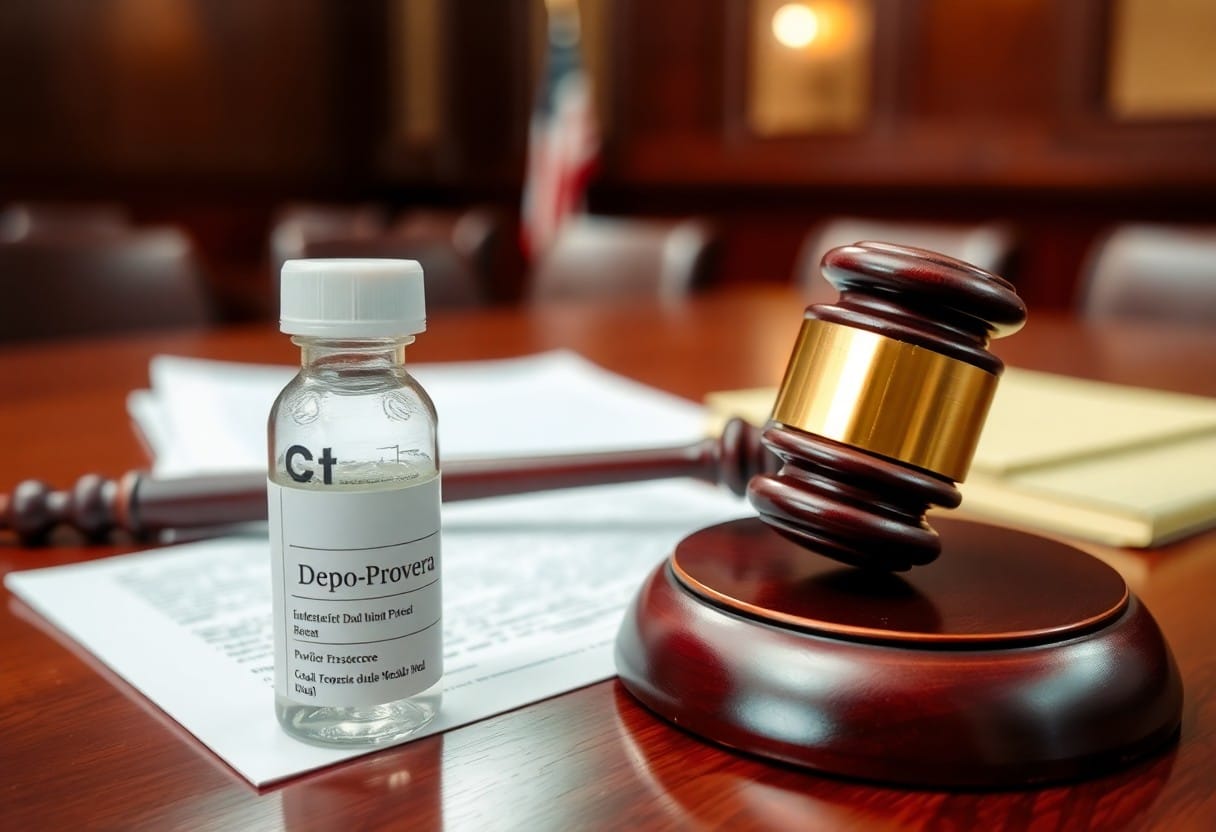Just imagine receiving a life-altering diagnosis linked to a medication you trusted. In this informative post, you will explore the serious risks associated with Depo-Provera, a popular contraceptive injection, particularly its alleged connection to brain tumors. You will learn through a daughter’s heartfelt story how this medication impacted her family, shedding light on the importance of awareness and informed decision-making. Join us as we uncover imperative details that could affect your health and well-being.
Understanding Depo-Provera
Your journey into understanding Depo-Provera starts with recognizing it as a hormonal contraceptive method that is administered via injection. It contains medroxyprogesterone acetate, a synthetic form of the hormone progesterone, which plays a key role in regulating your menstrual cycle and aiding in pregnancy prevention. Administered every three months, Depo-Provera provides a convenient and discreet option for women seeking effective birth control.
What is Depo-Provera?
Depo-Provera is a prescription contraceptive that is injected every three months to prevent ovulation. It works by releasing a hormone into your body that inhibits ovulation, thins the lining of the uterus, and thickens cervical mucus, making it difficult for sperm to reach an egg. This injectable method is particularly appealing for those looking for a long-term solution without the need for daily pills.
Common Uses and Benefits
One of the most popular uses of Depo-Provera is as an effective method for birth control, helping you to avoid unplanned pregnancies.
A major benefit of Depo-Provera is its high effectiveness rate, boasting a success rate of over 99% when used correctly. Additionally, many women report reduced menstrual bleeding and cramping, which can enhance your overall quality of life. It may also provide benefits such as decreased risk of endometrial cancer and potential relief from ovarian cysts. However, it’s important to discuss any potential side effects with your healthcare provider, including the possibility of bone density loss with long-term use, ensuring you make an informed decision.
Exploring Brain Tumors
Assuming you are navigating the complex world of brain tumors, it’s vital to understand their nature and how they impact health. These tumors, which can be either malignant or benign, require thorough investigation and understanding for effective treatment decisions. The journey to uncovering the risks associated with brain tumors begins with understanding their various types and symptoms.
Types of Brain Tumors
At the forefront of brain tumor awareness, you’ll encounter various classifications that can significantly affect treatment options. Below is a brief overview of prominent types:
| Type | Description |
| Astrocytomas | Originates from astrocytes, often infiltrative. |
| Meningiomas | Arises from the meninges, typically benign. |
| Oligodendrogliomas | Develops from oligodendrocytes, can be slow-growing. |
| Medulloblastomas | A cancerous type common in children. |
Recognizing these types can help you better understand the possible treatment approaches available.
Symptoms and Diagnosis
Brain tumors can manifest through a variety of symptoms that are often subtle but significant. You may notice headaches, changes in vision, or cognitive impairments. These symptoms can vary in intensity based on the tumor’s location and size.
The symptoms you experience can lead to a diagnosis through various methods such as MRI scans, CT scans, and neuropsychological testing. The presence of persistent headaches, nausea, or new behavioral changes can signal the need for further investigation. If you exhibit any of these symptoms, seeking immediate medical attention is vital for timely intervention. Early identification of brain tumors significantly increases the chances of effective treatment and management, underscoring the importance of being aware of your body and recognizing any unusual changes.

The Connection Between Depo-Provera and Brain Tumors
Some women may be concerned about the potential link between Depo-Provera and brain tumors. While reproductive health is often prioritized during discussions about hormonal contraceptives, understanding the broader implications on your health is necessary. As research evolves, you may find it beneficial to explore the evidence surrounding this connection to make informed decisions regarding your contraceptive options.
Research Findings
Connection between Depo-Provera and brain tumors has been a subject of investigation, with various studies exploring potential risks. Some epidemiological studies suggest a minimal correlation, indicating that while instances may be rare, a pattern could exist linking hormonal contraceptive use and certain tumor types. You should keep abreast of these developments to weigh your desired contraceptive methods against possible health implications.
Case Studies and Patient Stories
The evidence gathered from case studies amplifies the conversation surrounding Depo-Provera and its relation to brain tumors. These personal experiences may illustrate varying outcomes for different individuals. Here are some notable case studies:
- Case Study 1: 30-year-old female diagnosed with a meningioma six months after discontinuing Depo-Provera.
- Case Study 2: 25-year-old with a glioblastoma, who had received Depo-Provera for three years prior to diagnosis.
- Case Study 3: 40-year-old experienced severe headaches leading to a tumor diagnosis, with a history of using Depo-Provera.
Consequently, these cases exemplify a need for further investigation. While some instances link Depo-Provera to significant health outcomes, it is vital to consider individual factors such as genetic predisposition, lifestyle, and medical history. If you are using or have used Depo-Provera, staying informed on this topic may help you discuss any concerns with your healthcare provider. It’s important to prioritize your health by being vigilant about potential symptoms and seeking timely care.
Personal Impact: A Daughter’s Journey
Keep in mind that navigating through a loved one’s health crisis is an emotional rollercoaster. You may witness the profound changes in your family dynamics, as the weight of fear and uncertainty takes hold. Your journey will be marked by moments of resilience, love, and the harsh realities of a brain tumor diagnosis, ultimately shaping your understanding of strength and compassion.
Diagnosis and Treatment
Around the time of diagnosis, the focus shifts to understanding the tumor’s nature and determining the best course of treatment. You might find yourself involved in discussions about imaging scans, biopsies, and potential treatment options such as surgery, radiation, or chemotherapy, all crucial steps in the fight against the disease.
Coping with Diagnosis
Along this challenging path, coping with the diagnosis becomes crucial. You may experience a whirlwind of emotions, and it’s important to allow yourself to grieve the future you imagined, while simultaneously seeking support from friends, family, or support groups.
Another important aspect to consider is that coping with the diagnosis of a brain tumor involves finding a balance between facing your fears and embracing hope. You might discover that sharing your concerns about the prognosis with those close to you helps ease the emotional burden. Establishing open communication creates a safe space for expressing your feelings, allowing you to process the situation more effectively. By prioritizing self-care and seeking resources, you strengthen your ability to navigate this journey, ultimately realizing that you’re not alone in this battle.
Expert Opinions and Research Perspectives
All medical insights regarding the link between Depo-Provera and brain tumors emphasize the need for a thorough understanding of individual risks and benefits. While some studies indicate a potential association, many health professionals advocate for further in-depth research to clarify these findings. Engaging with your healthcare provider is crucial to navigate the complexities and make informed decisions regarding your contraceptive choices.
Oncologists’ Views
After extensive evaluations, oncologists largely stress the importance of considering multiple factors that contribute to brain tumor development. They advocate for personalized assessment of each patient’s situation, including genetic predispositions and environmental factors, rather than solely attributing risks to Depo-Provera use. This comprehensive approach can help you make decisions based on your unique health profile.
Ongoing Research
Opinions in the medical community suggest that research into the relationship between hormonal contraceptives like Depo-Provera and brain tumors is still evolving. Ongoing studies aim to uncover any possible correlation while examining long-term effects on women who use these methods. As findings emerge, they may lead to more tailored contraceptive advice and improved overall health outcomes. The goal is to empower you with updated information, ensuring your choices are guided by the most current evidence available.
Hence, staying informed about the latest developments in research is crucial for your health and well-being. Investigations are focusing on determining potential mechanisms underlying any association between hormonal contraceptives and brain tumor risk. Additionally, researchers aim to evaluate whether alternative contraceptive methods pose fewer threats. By keeping an eye on the results of these studies, you can gain greater awareness and confidence in discussing options with your healthcare provider.
Support Resources for Patients and Families
Despite the challenges that come with a brain tumor diagnosis, various support resources are available to help you and your family navigate this journey. These resources can provide emotional support, knowledge, and community connections that empower you during difficult times.
Support Groups
Along with educational resources, support groups offer a vital space for you to share experiences and gain insights from others facing similar challenges. These groups help foster a sense of community, allowing you to connect with fellow patients and caregivers who understand your emotions and struggles.
Educational Resources
Support and knowledge about brain tumors can significantly impact your ability to face this diagnosis. Reliable educational resources provide you with vital information about treatment options, potential side effects, and coping strategies. You can learn from specialized organizations, websites, and literature tailored to your needs, ensuring you have the most relevant details to make informed decisions.
In fact, many reputable organizations offer extensive educational materials about brain tumors, treatment protocols, and ongoing research. They provide easy access to peer-reviewed articles, webinars, and downloadable guides, helping you stay informed about the latest advancements. Utilizing these resources can strengthen your understanding of your condition and improve communication with your healthcare team, ultimately enhancing your journey through diagnosis and treatment.
Summing up
So, understanding the relationship between Depo-Provera and brain tumors is vital for you as a patient or caregiver. By advocating for informed discussions with healthcare providers, you can better navigate the potential risks and benefits associated with this contraceptive method. Your awareness may empower you to seek alternative options or additional screenings, ensuring that you prioritize both reproductive health and overall well-being. It’s necessary to stay informed, trust your instincts, and consult medical professionals regarding any concerns that arise during your personal health journey.



















